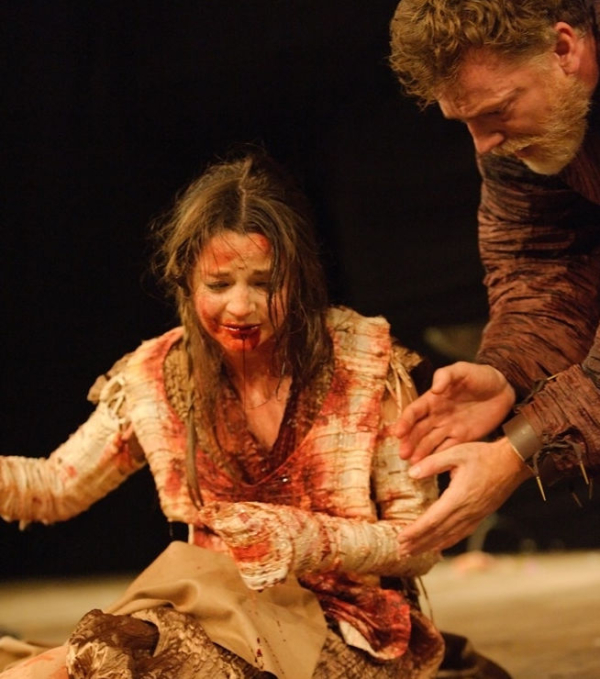Bloody marvellous? Titus Andronicus returns to The Globe
Lucy Bailey’s bloody ”Titus Andronicus”, returning after its notorious premiere in 2006, caused at least one critic to wince

© Simon Kane
Maxwell Cooter
WhatsOnStage
★★★★
It's easy to dwell on the bloody goings on but Bailey brings out the poetry of the play too. And while much of the action resembles a 16th century video nasty, there's some emotional power too. There's also more humour than in the 2006 production: particularly in Houston's manic Titus, looking like a particularly over-the-top television chef serving the fateful pie… When one sees productions as rich and coherent as this one, one does wonder just why this play was hardly performed until 50 years ago and is still rarely performed even now – perhaps theatres can't get the first-aid staff.
Charles Spencer
Daily Telegraph
★★★★
When Lucy Bailey’s production was first staged at Shakespeare’s Globe in 2006, it became famous for the number of people who fainted during the show, with audience members going down like ninepins in the theatre yard. On a cold dank evening that seemed utterly appropriate for this most punishing of plays, I didn’t see anyone faint at this welcome revival but more than a dozen distressed theatregoers were helped out of the auditorium by kindly ushers in the course of the performance…. For many of us Shakespeare is a fount of wisdom and beauty, and it is shocking to discover him writing the Elizabethan equivalent of a slasher movie. Yet if you have the stomach for it, the play is wonderfully gripping and seems to speak across the centuries to the horrors of our own troubled times, with its catalogue of dreadful violence and burning hatreds.
Holly Williams
Independent
★★★★
A confession: I fainted. I’m not alone: audiences are dropping like flies at this revival of Lucy Bailey’s infamously gory 2006 staging. So I can’t vouch for Act III, scene ii – but if it’s anything like the rest of this vivaciously staged, blackly comic and dizzyingly unrestrained production, it was probably exceptional. The swooning is testament to Flora Spencer-Longhurst’s astonishing performance as the raped and butchered Lavinia… Bailey also plays up the dark humour and absurdity, and Shakespeare rarely feels so speedily urgent. William Houston marries madcap mania and wounded pride as Titus; Indira Varma‘s Tamora is sinewy in her seductions… It is heady, oppressive. But groundlings, barraged by testosterone-pumped warriors and grandstanding politicians, are still swept up in the action – just don’t stand too close if you’re feeling light-headed…
Fiona Mountford
Evening Standard
★★★
I fear audience members are being a little wimpish… as most of the really grisly stuff happens off-stage. I’m afraid that the over-egged extremes of it all rather gave me and my companion the giggles… Bailey makes effective, immersive use of the whole space rather than just the stage, with portable platforms manoeuvring actors vibrantly into the midst of the groundlings. It’s all eye-catchingly visceral but there’s little depth, although Shakespeare admittedly didn’t provide much to work with, crafting an unwieldy play with few redeeming flights of poetry. Yet the lively production is more accomplished than individual performances, too many of which underwhelm. Houston gives an oddly whimsical turn at the play’s centre; it’s unclear whether this Titus would wreak havoc on a battlefield or feng-shui it.
Dominic Maxwell
The Times
★★★★
This is few people’s favourite Shakespeare – it’s too odd, too nasty, and it drags on a bit as it takes us towards a culinary conclusion in which our hero kills the men who raped his daughter, then serves them up to their mother in a pie. Yet Lucy Bailey’s blackly comical production is the best I’ve seen… from the moment you step into the incense-filled courtyard, Bailey and her designer, William Dudley, enmesh us in the action… Houston roots Titus’ outsized, capricious passions in a tangible tenderness… It’s a fine, galvanising performance that allows the other leads room to be less emphatic… It is, in short, a bloody good revival of a bloody, strange play. Albeit not one for faint-hearts.












